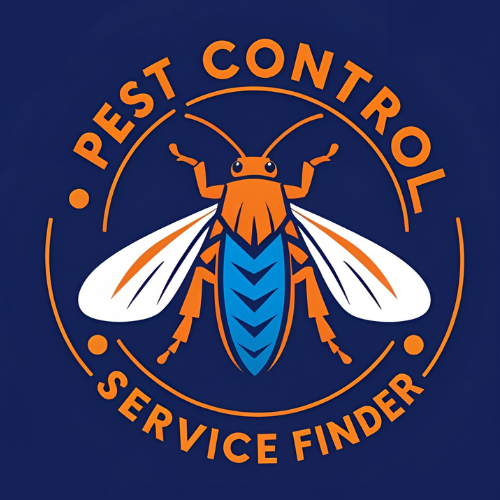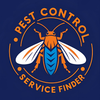Understanding the Cost Termite Treatment: Prices & Factors
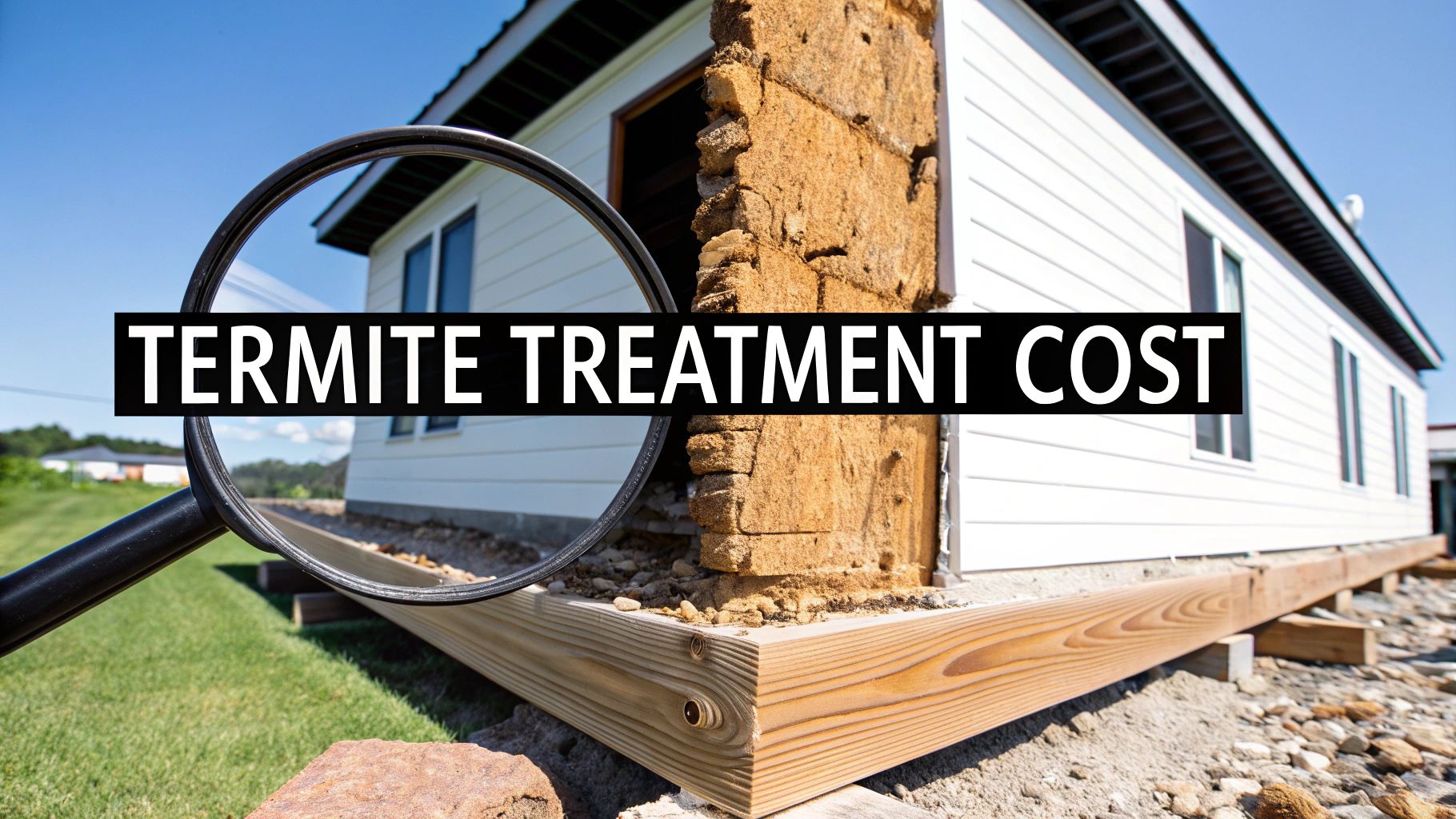
Call +1 855 224 3071 for a clear, no-obligation quote based on your home. Worried about what termite treatment might cost? While the average price lands between $700 and $2,000, it can be as low as $150 for a simple spray or climb over $5,000 for a major infestation needing fumigation.
Your Guide to Termite Treatment Costs
Finding out you have termites is stressful enough. The first question that pops into most homeowners' heads is, "How much is this going to set me back?" Getting a handle on the potential cost is the first real step to taking back your home from these destructive pests. For immediate help, call +1 855 224 3071.
The final price isn't a simple, flat-rate number; it's a direct reflection of the specific problem you're facing.
Think of it like a plumbing issue. A small drip under the kitchen sink is a quick, minor expense. But if a pipe bursts inside a wall, you're looking at a much bigger project and a far more significant bill. It’s the same with termites. A small, localized colony you catch early is much cheaper to handle than a massive infestation that’s been chewing through your home’s structure for years.
Breaking Down the Price Tag
The total cost of termite treatment really boils down to two things: the method used and the scale of the problem. Most treatments fall somewhere between $700 and $2,000, though basic jobs like pesticide sprays can be as cheap as $150.
On the other hand, for severe cases involving aggressive species like Formosan or drywood termites, the cost can easily jump to $5,000 or more. These situations often require intensive methods like whole-home fumigation. You can learn more about termite treatment expenses on thisoldhouse.com for a deeper look at the numbers.
A professional inspection is the only real way to get an accurate quote. An expert can assess the full extent of the damage, identify the exact type of termite, and recommend the most effective and wallet-friendly solution for your property. To get started, call +1 855 224 3071.
To give you a better idea of what to expect, here’s a quick overview of what you might pay for different professional services. This table lays out the most common treatment methods and their typical cost ranges, which can help you start budgeting.
Estimated Termite Treatment Costs at a Glance
| Treatment Method | Typical Scenario | Average Cost Range |
|---|---|---|
| Liquid Termiticide Barrier | Standard for subterranean termites around the home's perimeter. | $1,200 - $3,500 |
| Baiting Systems | Targeted treatment for specific colony locations; ongoing monitoring. | $1,000 - $2,500 |
| Spot Treatment (Chemical) | Addressing a small, contained infestation in one area. | $300 - $900 |
| Fumigation (Tenting) | Whole-home treatment for severe drywood termite infestations. | $2,000 - $8,000+ |
Just remember, these are ballpark figures. The only way to know for sure is to have a pro come out and take a look. Don't let the problem get worse—Call +1 855 224 3071 for a free, personalized quote from a local expert today.
What Really Determines Your Final Bill
For a personalized assessment of what your termite treatment will cost, Call +1 855 224 3071 today. There’s no such thing as a one-size-fits-all price because every single home and infestation is its own unique puzzle. The final bill you get is a direct reflection of several key variables, a lot like how a car repair bill depends on the model, the extent of the damage, and the specific parts needed.
To really understand your quote, you have to look at the big picture. From the size of your house to the exact type of termite causing all the trouble, each factor plays a huge role in the overall cost of termite treatment. Breaking these down helps you see why a small, localized issue is so much cheaper to fix than a massive structural problem that’s been festering for years.
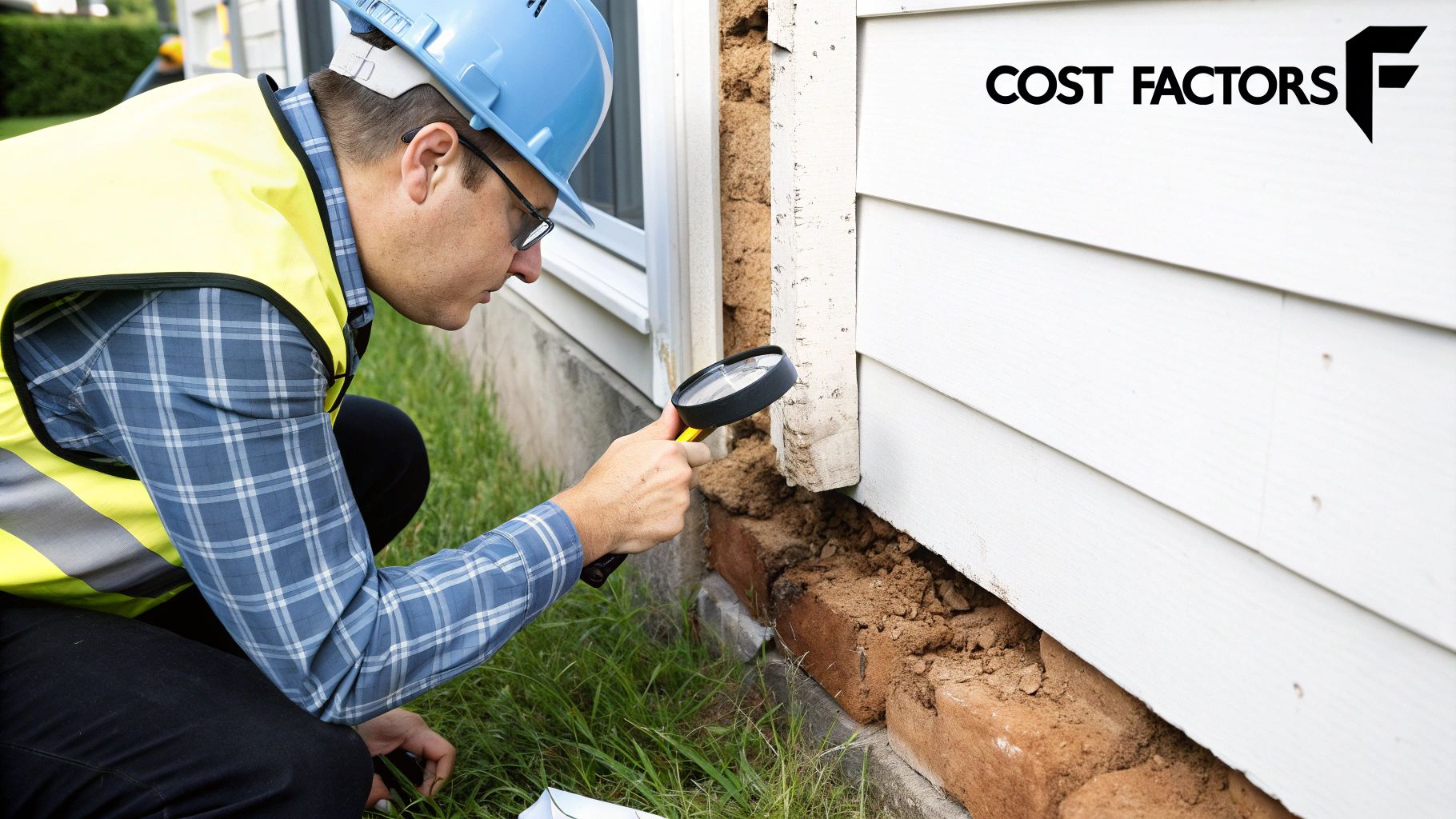
Home Size and Construction
The most straightforward factor is simply the size of your property. A bigger home requires more product, more time, and more labor to treat properly. A 3,000-square-foot house will naturally cost more to treat than a 1,200-square-foot bungalow just because there's more ground to cover.
Your home's construction matters, too. A simple slab-on-grade foundation is far easier (and cheaper) to treat than a complex foundation with a full basement and a tight crawl space. If technicians have to drill through concrete or squeeze into hard-to-reach areas, the labor time—and the final price—goes up.
Termite Species
Not all termites are created equal. The specific type of termite invading your property is a major cost driver because different species demand completely different battle plans.
- Subterranean Termites: The most common culprits. They live in the soil and are often handled by creating a liquid barrier around your foundation or installing bait stations—a moderately priced approach.
- Drywood Termites: These guys live inside the wood they’re eating, no soil contact needed. Getting them out can be tricky and may even require expensive whole-home fumigation (tenting).
- Formosan Termites: Known as "super termites" for a reason. This aggressive subterranean species builds massive colonies and causes devastating damage fast, often requiring more intensive and costly methods.
Getting the ID right is critical. Misidentifying the pest can lead to the wrong treatment, which is just a waste of time and money. For an expert identification and a clear quote, Call +1 855 224 3071.
Severity of the Infestation
The extent of the invasion is another huge piece of the cost puzzle. A small, new colony is way cheaper to eliminate than a mature, widespread infestation that has spread into multiple areas of your home.
Think of it like dealing with a small patch of mold versus a full-blown remediation. Catching it early saves you from a much larger, more invasive, and significantly more expensive problem down the line.
A pest control pro will assess the activity and damage. A minor, localized problem might only need a simple spot treatment, which is on the low end of the cost spectrum. But if termites are in your walls, attic, and foundation, you're looking at a comprehensive—and more expensive—treatment plan.
Chosen Treatment Method
As you'd expect, the method used to kill the termites directly shapes the final cost. A professional will recommend the best approach based on all the factors we've discussed, but the price points vary significantly.
| Treatment Approach | General Cost Impact | Best Use Case |
|---|---|---|
| Spot Treatments | Low | Small, accessible, and contained infestations. |
| Baiting Systems | Moderate | Ongoing colony elimination and monitoring. |
| Liquid Barriers | Moderate to High | Proactive and reactive defense against subterranean termites. |
| Fumigation (Tenting) | High | Severe, widespread drywood termite infestations. |
Each method has its pros and cons. A liquid barrier, for example, might have a higher upfront cost but can offer protection for many years, making it a solid long-term investment.
Your Geographic Location
Finally, where you live matters. Local labor rates, fuel costs, and even state regulations can influence pest control pricing. A treatment in a major city with a high cost of living will almost always be more expensive than the same job in a rural town.
This is also tied to how common termites are in your area. States in the "Termite Belt," like those in the Southeast, have much higher termite pressure, which impacts market prices. It's part of a global trend—the worldwide termite control market was valued at $5.48 billion in 2024 and is expected to keep climbing, according to a report from researchandmarkets.com.
Ready for a quote that actually reflects your specific situation? Call +1 855 224 3071 now to connect with a local professional.
Comparing Termite Treatment Methods and Prices
Ready to explore your options for termite treatment? Call +1 855 224 3071 to discuss which method is the right fit for your home and budget. Choosing a termite treatment isn’t like picking paint colors—different methods have vastly different strategies, costs, and levels of invasiveness. Knowing the difference is your first step toward making a smart decision.
Think of it like choosing a medical treatment. A minor issue might just need a simple, localized fix, while a more serious condition demands a comprehensive approach. The right termite treatment depends on the type of termite you have, how bad the infestation is, and the way your home is built. Let's break down the most common professional methods.
Liquid Termiticide Barriers: The Protective Moat
One of the most trusted and effective strategies for subterranean termites is the liquid termiticide barrier. This method involves creating an uninterrupted chemical zone in the soil around your home’s foundation. It acts like a protective moat that termites can't cross without picking up a lethal dose.
Technicians dig a shallow trench around your foundation and apply a specialized liquid termiticide. When termites forage from their underground colonies toward your home, they have to pass through this treated soil. The best part about modern, non-repellent termiticides is that termites don't even see them coming. They unknowingly track the poison back to the colony, eventually causing its collapse. The cost of termite treatment for this method usually runs from $3 to $15 per linear foot, making it a powerful, long-term defense.
Baiting Systems: The Trojan Horse Approach
If a liquid barrier is a fortress wall, a baiting system is more like a Trojan horse. Instead of a perimeter defense, bait stations are strategically placed in the ground around your property where termites are likely to be active. These stations contain a cellulose material (termite food!) laced with a slow-acting poison they can’t resist.
Foraging workers find this bait, eat it, and carry it back to share with the entire colony, including the queen. The poison disrupts their natural growth cycle and slowly wipes out the colony from the inside. Bait systems are a great low-impact option that costs between $8 and $12 per linear foot. They’re especially useful for properties where digging trenches for a liquid treatment isn't practical. If this sounds like the solution you need, call +1 855 224 3071 for a consultation.
Baiting systems are a clever way of using termites' own social behavior against them. By targeting the workers who feed the rest of the colony, you can methodically eliminate the entire population without widespread chemical application.
While professional treatments are the gold standard, some homeowners wonder about other options. If you're interested, you can check out our guide on how to kill termites naturally for a look at less conventional methods.
Fumigation and Tenting: The Last Resort
For widespread and severe infestations, especially from drywood termites living deep inside your home's structure, fumigation—also known as tenting—is often the only guaranteed solution. It's the most intensive and expensive option, but it's also the most thorough. Nothing else comes close.
Your entire house is enclosed in a massive tent, and a fumigant gas is pumped inside. This gas gets into every crack, crevice, and void, reaching termites hidden inside walls, furniture, and wooden beams that other treatments simply can't touch. The process does require you and your pets to leave for a few days, but it ensures 100% eradication of the termites inside. The cost of termite treatment via fumigation can range from $1,600 to over $8,000, heavily depending on your home's size.
This infographic gives you a quick visual breakdown of how regional factors can affect your final termite treatment costs.
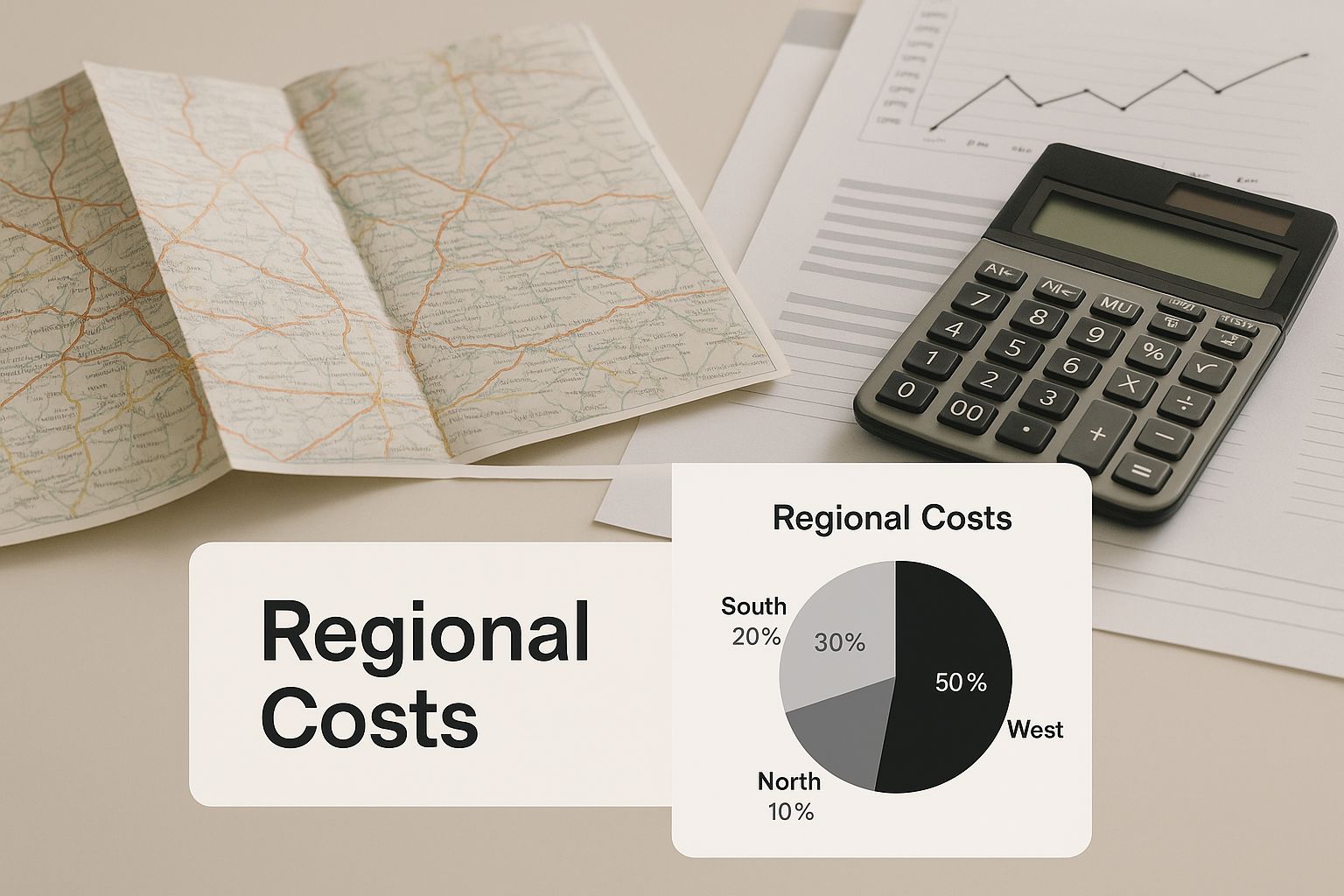
As you can see, local labor rates and how common termites are in your specific area play a huge role in the final price you'll pay.
Comparison of Termite Treatment Methods
Choosing the right method can feel overwhelming. To help simplify your decision, we’ve put together a table that breaks down the key differences between the main professional termite treatments at a glance.
| Treatment Method | Average Cost | How It Works | Best For | Pros & Cons |
|---|---|---|---|---|
| Liquid Termiticide Barrier | $1,200 - $3,500 | Creates a continuous chemical barrier in the soil around the foundation to kill or repel termites. | Subterranean termite infestations and long-term prevention. | Pros: Highly effective, long-lasting (5+ years). Cons: Can be invasive, involves digging and drilling. |
| Baiting Systems | $1,000 - $2,500 | Uses strategically placed bait stations with poison that termites carry back to eliminate the entire colony. | Ongoing colony elimination and monitoring; properties where liquid treatment is impractical. | Pros: Less invasive, targets the entire colony, environmentally targeted. Cons: Slower to act, requires ongoing monitoring. |
| Fumigation (Tenting) | $2,000 - $8,000+ | Encloses the entire home in a tent and fills it with a gas fumigant to kill all termites inside. | Severe or widespread drywood termite infestations that are inaccessible. | Pros: Eradicates 100% of termites in the structure. Cons: Highly expensive, requires vacating the home for days. |
With this information, you can have a much more productive conversation with a pest control professional. An expert can inspect your property and recommend the most effective and economical solution for your specific situation. To get a professional opinion and a precise quote, call +1 855 224 3071 today.
Termite Bonds and Warranties: Your Long-Term Protection Plan
For immediate answers about termite bonds and warranties, Call +1 855 224 3071.
Getting a professional termite treatment isn't just a one-and-done deal. It’s really the first step in a long-term plan to keep your home safe. This is where a termite bond or warranty comes into play, and it's a huge asset. Think of it less like a service and more like an insurance policy for your biggest investment.
A termite bond is basically an annual contract you have with a pest control company. After they've done the initial treatment, this agreement makes sure your home stays protected from any future termite invasions. It’s a proactive way to dodge the catastrophic, five-figure repair bills that can pop up from new, unchecked termite damage.
Understanding Your Termite Bond Coverage
So, what exactly are you getting with a termite bond? The details can differ a bit from one company to the next, but most good bonds include two key things that offer incredible value and peace of mind. For personalized info on your bond options, Call +1 855 224 3071.
- Annual Inspections: A trained pro will come out to your house every year for a thorough inspection. They’re looking for any new signs of termite activity, making sure the original treatment is still holding up, and pointing out any new risks like moisture problems or wood touching the ground.
- Re-treatment Guarantee: This is the heart of the bond. If termites show up again—either during an inspection or anytime while the bond is active—the company will come back and re-treat the problem areas at no extra cost to you.
A termite bond turns the wild, unpredictable cost of termite treatment into a simple, fixed annual fee. You’re paying a small, predictable amount to avoid a massive, surprise expense from a new infestation and the repairs that follow.
Breaking Down the Costs
The money side of a termite bond is pretty straightforward. You’ll have the initial cost for the big treatment, followed by an annual renewal fee to keep the protection going.
The first payment covers getting rid of the current termite problem completely. After that, the annual renewal fee for a termite bond usually runs between $300 and $700. This yearly fee pays for your inspection and that all-important re-treatment guarantee, which could literally save you thousands if termites ever decide to return.
While some homeowners might look into other ways to protect their property, you can learn more by reading about natural termite control methods to see the full range of options out there.
https://www.youtube.com/embed/Bx-YgqqHs2U
In the end, a termite bond is all about long-term financial security. It's a small, steady investment that shields you from the enormous structural and financial nightmare termites can cause. We're talking about the difference between a small yearly fee and a potential repair bill that could easily match a down payment on a car.
Don't leave your home's safety to chance. Call +1 855 224 3071 to learn how a termite bond can safeguard your property for years to come.
DIY vs. Professional Termite Treatment: A Cost Breakdown
For a definitive answer on the best approach for your home, Call +1 855 224 3071.
When you find termites, your first instinct might be to grab a DIY solution from the hardware store. On the surface, it makes sense—why pay for a professional when a bottle of spray or a few bait stakes costs so much less? But is that upfront savings real, or just a temporary illusion?
Trying to tackle a termite problem yourself seems like an easy way to control the cost of termite treatment. The problem is, a failed DIY attempt can turn a small pest issue into a major structural and financial nightmare, with costs that spiral out of control.
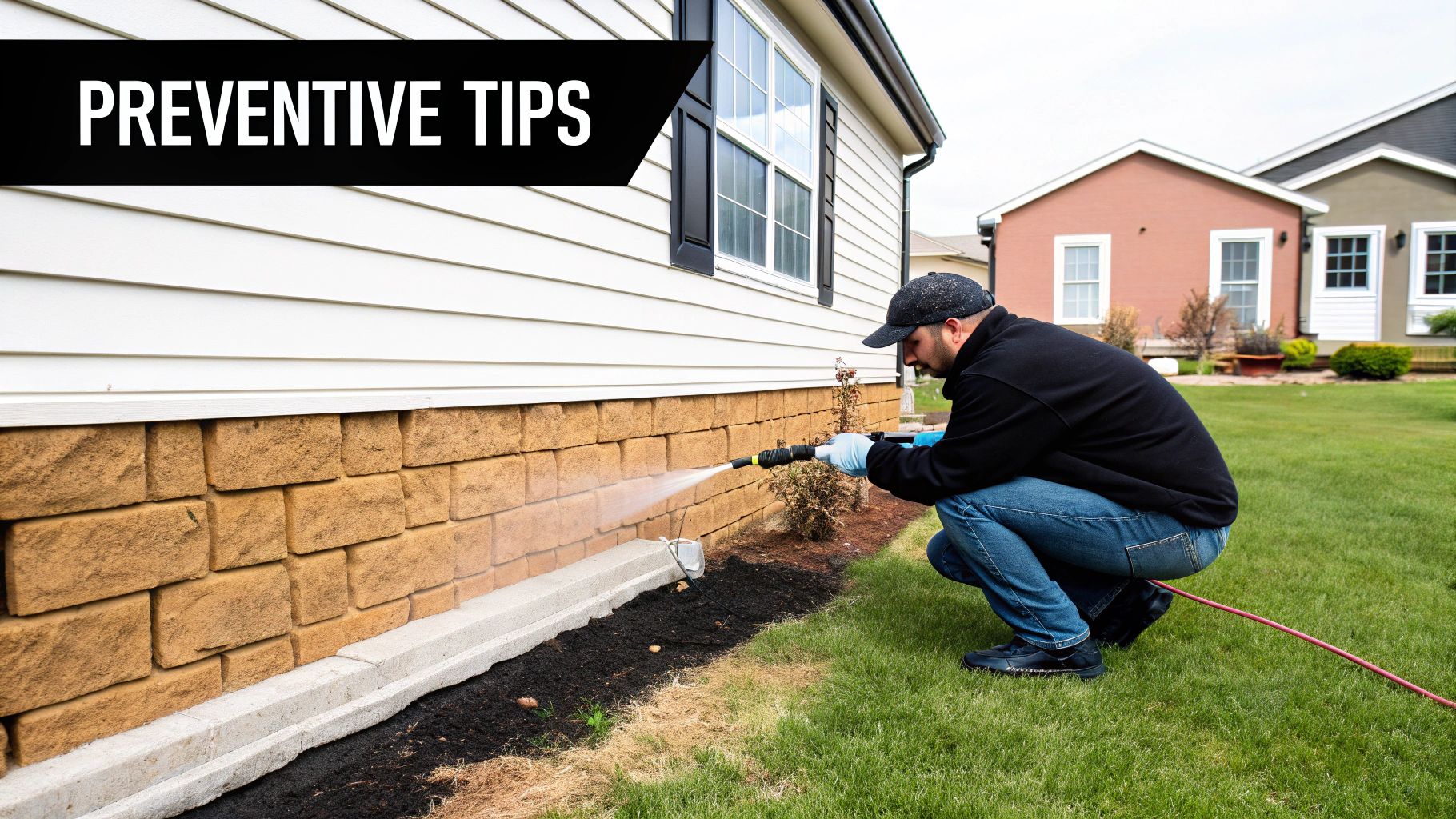
The Hidden Costs of DIY Termite Control
That low price tag on DIY products is tempting, but it masks some serious downsides. The success of any termite treatment hinges on applying it correctly, and that's exactly where most homeowners fall short.
Professionals bring specialized equipment and commercial-grade termiticides to the job—stuff that's far stronger than anything you can buy. More importantly, they have the training to know what kind of termite you have, find where the colony is hiding, and hit it with precision. A store-bought spray might kill a few worker termites you can see, but it almost never reaches the queen and the colony's core deep within your walls.
The real danger of a botched DIY job isn't the wasted $50 or $100. It's the false confidence it gives you. You think the problem's gone, but the colony is still there, silently eating away at your home's structure for months or even years.
If you've tried a DIY fix and aren't sure it worked, it's time for a professional opinion. Call +1 855 224 3071 for a complete inspection.
A Scenario: The True Cost of Failure
Let's break it down. Imagine you spend $200 on different DIY traps and sprays over six months. You notice fewer termites and figure you’ve solved it. But a year later, you find out they never left—they just moved to an area you couldn't see. Now they've caused major damage to a floor joist and a support beam.
A structural engineer hands you a repair bill for $4,500. On top of that, you still need to hire a pro to finally kill the colony for another $1,500. Your attempt to save a little money has now cost you a total of $6,200. This is a common story, and it's why professional treatment, which usually comes with a warranty, is almost always the smarter financial move. You can learn more in our complete guide to DIY termite treatment options.
The Professional Advantage
Hiring a professional isn't just about buying chemicals; it's about buying expertise and guaranteed results. There's a reason the global termite treatment market is projected to hit $15 billion by 2025—homeowners know the value of getting it done right by major companies like Orkin and Rentokil. You can read more about the growth of the termite treatment market on archivemarketresearch.com.
A professional service delivers:
- Accurate Identification: They’ll know exactly what type of termite you're dealing with so they can use the right treatment.
- Targeted Application: They use special tools to get the treatment to the heart of the colony.
- Guaranteed Results: Most pro treatments include a warranty. If the termites come back, so do they—at no extra charge to you.
Don’t gamble with your biggest investment. For guaranteed results and real peace of mind, Call +1 855 224 3071 today.
How to Get an Accurate Termite Treatment Quote
For a direct line to a certified local expert and a trustworthy quote, Call +1 855-224-3071 right now. Getting a solid, fair estimate for the cost of termite treatment shouldn’t feel like you're navigating a minefield. With the right approach, you can easily find a pro who delivers real value and protects your home.
It all starts with a thorough, professional inspection—and I don't mean a quick five-minute walk-around. A real assessment means a detailed check of your home's interior and exterior, from the foundation and crawl spaces to the attic and any wood structures. The technician’s job is to pinpoint the exact termite species, find where they're active, and map out the full extent of the damage.
Questions to Ask Your Technician
That inspection is your golden opportunity to get some answers. Don't hesitate to ask direct questions that help you understand what's being proposed and why it costs what it does. The quality of their answers tells you everything about their expertise.
Here are a few must-ask questions:
- What type of termite am I dealing with?
- Can you physically show me the infested areas and the damage?
- What treatment are you recommending, and why is that the best choice for my house?
- Once it’s dry, is the treatment safe for my kids and pets?
- What exactly does your warranty cover, and for how many years?
If you get clear, confident answers, you’re likely talking to a real pro. Vague replies or technical jargon without explanation should set off alarm bells.
A detailed, written estimate is absolutely non-negotiable. It should itemize all costs (labor, materials), list the specific chemicals being used, and include a diagram showing exactly where they plan to treat.
Comparing Quotes and Spotting Red Flags
It’s always a smart move to get at least two or three quotes from different reputable companies. When you lay them side-by-side, look past the final number. Compare the treatment method, how thorough the inspection felt, and the fine print on the warranty. The cheapest option isn’t a bargain if it’s a weaker treatment with a flimsy guarantee.
For another expert opinion to compare against, Call +1 855-224-3071 today.
Finally, watch out for high-pressure sales tactics or anyone pushing you to sign on the spot. A professional will give you the space and information you need to make a smart decision. If you get a quote without a full inspection or the pricing seems fuzzy, walk away.
Answering Your Top Questions About Termite Costs
Got questions about the cost of termite treatment? Get fast answers by calling +1 855 224 3071 now. Most homeowners run into the same handful of questions when they suspect a termite problem. Getting straight answers is the first step toward making a smart decision.
Let's clear up some of the most common concerns right now.
How Often Should I Get a Termite Inspection?
The gold standard for most homeowners is an annual professional termite inspection. This is especially critical if you live in a high-risk area, like anywhere in the Southeast.
Think of it like a yearly check-up for your house. It’s a small, predictable expense that acts as your best line of defense. Catching termites early is the absolute best way to sidestep the massive cost of treating a full-blown infestation and repairing the damage they leave behind. This simple, proactive step can literally save you thousands.
Does Homeowners Insurance Cover Termite Damage?
Unfortunately, the answer here is almost always a hard no. The vast majority of standard homeowners insurance policies do not cover damage or treatment costs for termites.
Insurers see termite infestations as a preventable maintenance issue, which means the financial responsibility falls squarely on your shoulders. This is exactly why getting professional inspections and termite bonds is so important—they fill a huge financial protection gap that your insurance policy won't touch.
Because insurance rarely covers termite damage, being proactive is everything. Investing in annual inspections isn't just about pest control; it's about protecting the structural and financial health of your single largest asset.
Can I Get a Free Termite Inspection?
Yes, you absolutely can. Most reputable pest control companies, including the local experts we connect you with, offer a free initial inspection to figure out what's going on. It's a completely no-risk way to get a professional diagnosis.
To schedule your free inspection and get a detailed quote with zero financial commitment, call +1 855 224 3071 now.
During this visit, a pro will identify the exact type of termite you're dealing with, gauge the size of the problem, and give you a detailed, written estimate for the best treatment plan. This lets you understand the specific cost of termite treatment for your property before you ever have to spend a dime.
At Pest Control Service Finder, we connect you with vetted, local exterminators who provide clear, upfront pricing and guaranteed results. For a free, no-obligation quote and same-day service, visit https://pestcontrol-service-finder.com.
